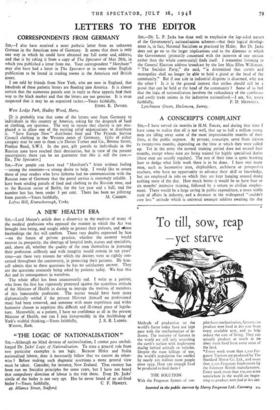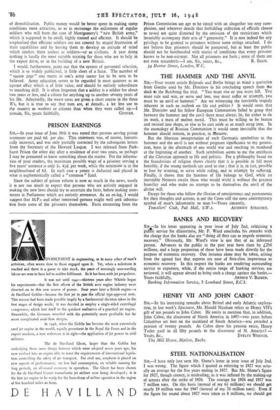A CONSCRIPT'S COMPLAINT SIR,—I have served six months in H.M.
Forces, and during that time I have come to realise that all is not well, that up to half a million young men are idling away some of the most impressionable months of their lives, at the public expense. At present, conscripts serve from sixteen to twenty-two months, depending on the time at which they were called up. Yet in the army the normal training period does not exceed four months, except where men are being trained for highly specialised duties (these men are usually regulars). The rest of their time is spent learning how to dodge what little work there is to be done. I have met many men, such as locomotive men, shipbuilders, architects or prospective teachers, who have no opportunity to advance their skill or knowledge, but are employed in jobs on which they are kept hanging around doing nothing most of the day. How much better it would be to have four or six months' intensive training, followed by a return to civilian employ- ment. There would be a large saving in public expenditure, a more stable state of affairs in industry, and a decrease in the widespread "couldn't care less" attitude which is universal amongst soldiers awaiting the day of demobilisation. Public money would be better spent in making camp conditions more attractive, so as to encourage the enlistment of regular soldiers who will form the core of Montgomery's "new British army," which is supposed to be small, highly trained and efficient. It should be emphasised that efficient soldiers are not created by stupid frustration of their capabilities and by leaving them to develop an attitude of mind which renders them useless as soldiers—or as civilians. A year doing nothing is hardly the most suitable training for those who are to help in the export drive, or in the building of a new Britain.
I would, furthermore, point out that the system of personnel selection, which is so widely publicised, is little short of a farce. The number of "square pegs" one meets in one's army career has to be seen to be believed. Army education seems to be regarded in most quarters as an upstart affair which is of little value, and should be entirely subordinate to marching drill. It is often forgotten that a soldier is a soldier for about two years or less, and a citizen for anything up to another seventy years of his life. Admittedly, the worst cases are given a short course in the three R's, but it is true to say that men are, at demob., a lot less use to the country as workers or citizens than when they were called up.—!



































 Previous page
Previous page